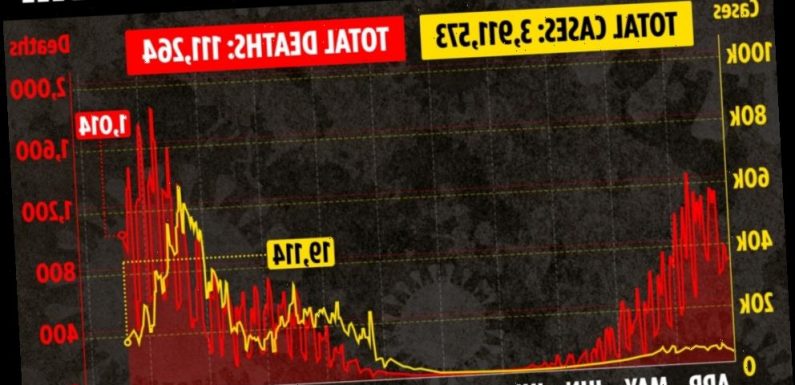
EASING lockdown over summer could lead to a FOURTH wave of coronavirus, scientists have warned.
Experts reporting to Sage said vaccines are “insufficient” to allow the UK to go back to normality “within the year” without causing thousands of hospitalisations and deaths.
? Read our coronavirus live blog for the latest news & updates
Even with the successful vaccine rollout, the Government’s scientific advisers said there could be a further 130,000 Covid deaths between now and next June.
Long-suffering Brits have had to endure wave after wave during the pandemic – and Boris Johnson has urged people to continue to follow the Covid rules.
The Prime Minister is set to reveal a roadmap out of lockdown – with pubs to open in May without the hated 10pm curfew.
However, one study released yesterday by Sage suggests there will be 750 deaths a day in England by November, with 20,000 people in hospital fighting the virus.
The paper, by a team from the University of Warwick, has considered the effect of gradually easing restrictions from the end of February to the beginning of September.
And while both the Pfizer and Oxford vaccines cut transmission by 60 per cent, the research said it might be insufficient to fight the more aggressive Covid mutations.
This comes despite the announcement yesterday that the Oxford/AstraZeneca vaccine does protect against the Kent strain.
Researchers at Warwick University said: "With the new aggressive covid strain, likely transmission efficacies prove insufficient to prevent further infection outbreaks across the population.
"This means that the proportion of individuals that do not accept the vaccine together with the proportion for whom it is ineffective in protecting, may still account for significant further severe disease even after the programme is completed.
SLOW PROGRESS
"We see that even with the highest possible uptake and fastest vaccination programme, full relaxation by the time schools return in September would still result in significant further disease."
Even waiting until the start of 2022 to lift all restrictions would see a wave in the first quarter of the year, the study claimed, with similar daily deaths currently being experienced now.
However, they suggest that easing restrictions to last summer's level, with six people allowed to meet inside, will only create "minimal" further virus burden.
The second paper, by Professor Neil Ferguson’s team at Imperial College London, says the R-rate is likely to climb to four, with an additional 130,800 fatalities between now and June next year.
It added that the Government should be cautious about gradually lifting lockdown restrictions between March and July.
But this comes despite the current success that suggests England's R rate is now below 1 for the first time since July.
The official figure – which represents the number of people an infected person will pass Covid onto – is now between 0.7 and 0.9, Sage said yesterday.
Both research models were produced by the Sage subgroup SPI-M and discussed at a meeting attended by Sir Patrick Vallance and Professor Chris Whitty on January 14.
Not all hope is lost, however. New data has revealed that cases of the virus have plummeted by 70 per cent since New Year's Day.
And our vaccine rollout – one of the best in the world – has seen nearly 11 million Brits inoculated.
The number of new Covid infections yesterday were down by more than a third in a week as almost 20 per cent fewer patients died.
A total of 3,911,573 have now tested positive for the bug in the UK since the start of the pandemic while 111,264 have lost their lives.
But yesterday's rise in infections is almost 10,000 fewer (34 per cent) than last Friday's jump when another 29,079 cases were confirmed.
The rise in deaths is also 18.5 per cent smaller than it was last Friday, when 1,245 fatalities were recorded.
Source: Read Full Article

